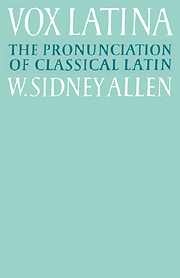Foreword to the first edition
Published online by Cambridge University Press: 16 February 2010
Summary
In discussions on the subject of Latin pronunciation two questions are commonly encountered; they tend to be of a rhetorical nature, and are not entirely confined to non-classical disputants. First, why should we concern ourselves with the pronunciation of a dead language? And second, how in any case can we know how the language was originally pronounced?
In answer to the first question, it may reasonably be held that it is desirable to seek an appreciation of Latin literature, and that such literature was based on a living language. Moreover, much of early literature, and poetry in particular, was orally composed and was intended to be spoken and heard rather than written and seen. If, therefore, we are to try and appreciate an author's full intentions, including the phonetic texture of his work, we must put ourselves as nearly as possible in the position of the native speaker and hearer of his day. Otherwise, however full our grammatical and lexical understanding of the work, we shall still be missing an important element of the contemporary experience. It is true that we can have a lively appreciation of, say, Shakespeare, whilst reading or hearing his work in a modern pronunciation—but in this case the two languages are not far removed from one another, and whilst individual sounds may have changed to some extent, the relations between them have been largely preserved; the situation is already very different, even within English, if we go back only as far as Chaucer.
- Type
- Chapter
- Information
- Vox LatinaA Guide to the Pronunciation of Classical Latin, pp. vii - xPublisher: Cambridge University PressPrint publication year: 1978



